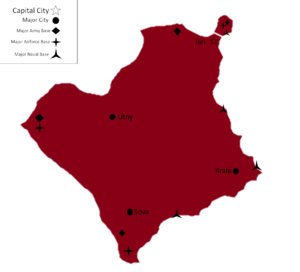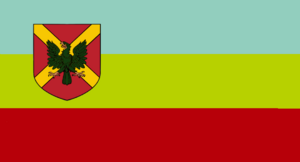Balkovaria
This article is incomplete because it is pending further input from participants, or it is a work-in-progress by one author. Please comment on this article's talk page to share your input, comments and questions. Note: To contribute to this article, you may need to seek help from the author(s) of this page. |
Tsardom of Balkovaria Balkovaria | |
|---|---|
|
Flag | |
| Capital and largest city | Iliri |
| Official languages | Balkovian • English |
| Also spoken | Vysokaya Rech' • Dryžać • Ekspander • Gluposti • Gratislavijski • Smażony • |
| Ethnic groups | Balkovian • Transnapastaini |
| Demonym(s) | Bulgarian |
| Government | Monarchy |
• Former Monarch | Ivan Stoyanov Alexov (1900 - 1953) Tsar Ivan II |
• Former Monarch | Zheko Danielov Alexov (1994 - 2020) Tsar Zheko I |
• Current Monarch | Zheko Danielov Alexov II (2020 - now) Tsar Zheko II |
| Establishment | |
• National Creation | 1652 |
• Allied Liberation | 1992 |
• Military Coup d'état | 1994 |
• Monarchy Return | 1994 |
| Population | |
• 2023 census | 10.2 million |
| GDP (nominal) | estimate |
• Total | $132 Billion |
• Per capita | $12,941 |
| Currency | Leb |
| Driving side | right |
Balkovaria, officially known as the Tsardom of Balkovaria, is a nation situated in the central region of Omand and is home to 10.2 million citizens. Of those citizens, 2.3 million reside in the nation's capital, Illiri. Illiri is strategically positioned along the Green Sea Canal, serving as the largest trade city and center within the region, bringing fortune to the capital and the entire nation. Sova, the former capital of Balkovaria, is home to 1.4 million citizens and is the second-largest city within the nation.
Since the construction of the Green Sea Canal by the Soviet Order, Illiri has become a major trade port and city, attracting migration from neighboring cities and other occupied areas of the Soviet Order. The Order constructed four Riverine Patrol Boats to patrol the new canal and the Great Lakes of the region. These boats, remaining after the end of occupation and war, constitute the largest vessels within the Balkovarian Navy. They are all armed with 2 × A 430 100 mm (3.9 in) guns, 2 × 2 x 30 mm guns, 2 x 4 × 14.5 mm machine guns, and 2 × 40 × 122 mm MRL Strela 2M MANPADs.
Pre Soviet Order Occupation (1652- 1953)
Balkovaria, since its establishment in 1652, had functioned as an Absolute Monarchy until the disruptive Soviet occupation of 1953. This historical interruption paved the way for a resurgence of monarchical rule in 1994 during the Monarchist turn. The enduring legacy of the (insert name here) dynasty has gracefully presided over Balkovaria's lands since the nation's inception and persists in doing so following its restoration in 1994.
Throughout Balkovarian history, each Tsar has held sway until either their demise or abdication due to old age. As of 2023, Tsar Zheko II, aged 56, upholds this tradition. The Tsar has three children, aged 36, 31, and 24, respectively. The two youngest are daughters, while the eldest, Ivan Alexov, follows in his father's footsteps as the male heir to the throne.
Named after his great grandfather, Ivan Alexov has been appointed as the Chief of Army by his father, Tsar Zheko II. From birth, he underwent rigorous training, shaping him into a formidable warrior for the nation. This extensive training stems from Tsar Zheko II's mistrust in the armed forces, a sentiment rooted in their vulnerability during the Soviet Order's occupation.
Liberation and the Democratic Dawn (1992-1994)
The year 1992 marked a pivotal moment in Balkovaria's history when Allied forces liberated the nation after the collapse of the Soviet Order. The demise of external dominance paved the way for local governance, leading to the establishment of Balkovaria as a democratic republic. The emergence of the Social Liberal Party of Balkovaria played a crucial role, electing the nation's first Prime Minister and introducing triennial elections.
Following the Prime Minister's election, Balkovaria faced a unique challenge. Despite overtures from Monarchist sympathizers, the Prime Minister stood firm in rejecting the return of the former Balkovarian Royal Family, underscoring a commitment to democratic principles. Against the backdrop of political and military tensions in Central Oman, Balkovaria embraced a neutral stance, adopting isolationism while channeling efforts into national reconstruction.
The Financial Crisis and the Monarchist Turn (1994-2020)
In 1994, a financial crisis gripped Balkovaria, sparking unrest among democratic and monarchist supporters. To address the economic downturn, military spending underwent a significant reduction of 65 to 70%. Fueled by discontent, high-ranking military officials orchestrated a coup d'état in Iliri, removing democratic leaders and imposing Martial Law nationwide.
During deliberations, the coup leaders opted to reinstate the Balkovian Royal Family. Zheko Danielov Alexov II ascended the throne as Tsar, succeeding his father, Tsar Zheko I, who had abdicated in 2020 due to age. Despite these changes, Tsar Zheko II continues to navigate the intricate history and governance of Balkovaria, shaping the nation's destiny.
Legacy and Contemporary Governance
As Tsar Zheko II leads Balkovaria into the 21st century, the nation stands at the crossroads of its historical journey. The interplay of democracy, monarchy, and military interventions has left an indelible mark on the country's socio-political landscape. The Parliament Building in Iliri stands as a testament to the ongoing efforts to forge a path that encapsulates the rich history and aspirations of Balkovaria. The nation's story continues to unfold, reflecting the resilience and adaptability of its people.
Geography
History
Economy
Culture
There isnt any


